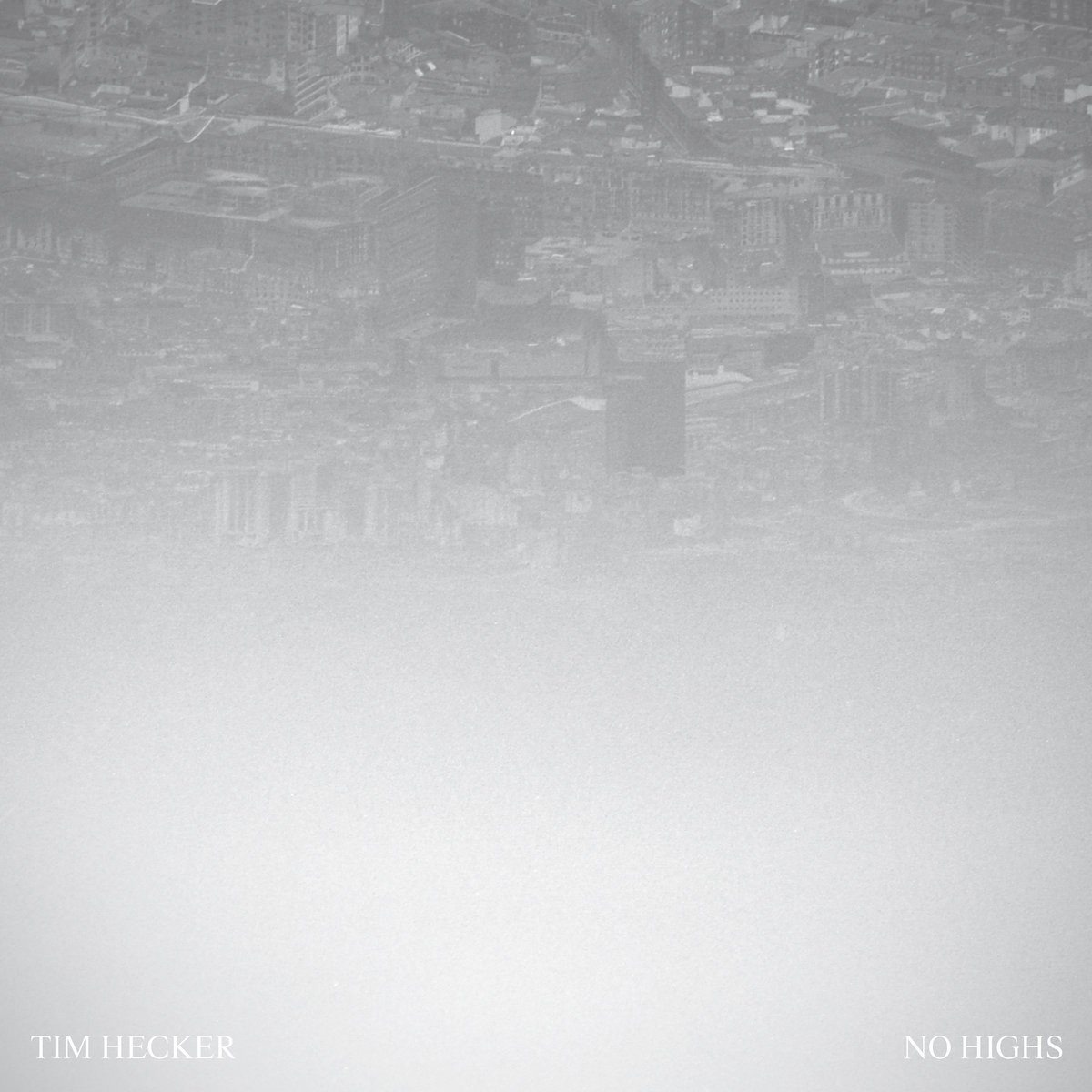 This latest opus from Tim Hecker is amusingly billed as "a beacon of unease against the deluge of false positive corporate ambient." Given the weighty themes of his previous albums, Hecker's actual inspiration presumably runs much deeper than that, yet the "beacon of unease" part of that claim may be more literal than it sounds, as one of the album's central features is described as "Morse code pulse programming." While I am not well-versed enough in Morse code to determine if Hecker's oddly timed rhythms are covertly incorporating text or a narrative into these warped and nightmarish soundscapes, the gnarled and harrowing melodies that accompany those erratic pulses are more than enough to make the album thoroughly compelling listening regardless. Aside from that, No Highs marks yet another significant creative breakthrough for a formidable artist hellbent on continual reinvention and bold evolution. While it is hard to predict whether or not No Highs will someday be considered one of Hecker's defining masterpieces or merely an admirable and unique detour, its handful of set pieces feel quite brilliant to me and I do not expect my feelings to change on that point..
This latest opus from Tim Hecker is amusingly billed as "a beacon of unease against the deluge of false positive corporate ambient." Given the weighty themes of his previous albums, Hecker's actual inspiration presumably runs much deeper than that, yet the "beacon of unease" part of that claim may be more literal than it sounds, as one of the album's central features is described as "Morse code pulse programming." While I am not well-versed enough in Morse code to determine if Hecker's oddly timed rhythms are covertly incorporating text or a narrative into these warped and nightmarish soundscapes, the gnarled and harrowing melodies that accompany those erratic pulses are more than enough to make the album thoroughly compelling listening regardless. Aside from that, No Highs marks yet another significant creative breakthrough for a formidable artist hellbent on continual reinvention and bold evolution. While it is hard to predict whether or not No Highs will someday be considered one of Hecker's defining masterpieces or merely an admirable and unique detour, its handful of set pieces feel quite brilliant to me and I do not expect my feelings to change on that point..
The general tone of No Highs feels like a continuation of the smeared, howling anguish of Konoyo and Anoyo, approximating lonely distress signals emitted from the smoldering ruins of Konoyo's planetary death spasms. Compositionally, however, No Highs feels like an entirely different animal altogether, as Hecker has swapped out roiling maximalism for simmering minimalism and distilled his palette to little more than insistently telegraph-like synth pings punctuated with occasional plunges into swirling and howling cosmic horror. In fact, the album makes me feel like I am stationed at a desolate outpost in a blackened wasteland nervously watching apocalyptic storms mass on the distant horizon. Unsurprisingly, the strongest pieces tend to be the ones where those storms reach their full fury, such as the opening "Monotony."
Like many pieces on the album, "Monotony" begins modestly with an insistently pinging synth rhythm, but that calm proves to be illusory as one hell of a howling maelstrom stealthily forms to propel the piece towards a thoroughly harrowing and gnarled climax. I am especially impressed at how thoroughly Hecker smears and warps his sounds, as they continually feel like they are fading in and out of focus (and in and out of tune) to create organically shapeshifting (and oft-ugly) harmonies and an immersively spatialized listening experience. To my ears, No Highs often evokes a nightmarish (and more visceral) inversion of Boards of Canada's sun-dappled and nostalgia-soaked "worn and wobbly tape" aesthetic.
The longest pieces tend to be the strongest as well, as lead single "Lotus Light" blossoms into yet another tour de force of smeared and undulating horror, while "Anxiety" culminates in a roiling shoegaze/dreampop finale with some help from recurring guest saxophonist Colin Stetson. I did not expect to be so excited about Tim Hecker enlisting a saxophonist, but his instincts turned out to be characteristically unerring in that regard, as Stetson's infrequent surfacings are a reliable highlight. There are a few other pleasant surprises lurking elsewhere, such as pedal steel flourishes, buried techno grooves, or fluttering Terry Riley-style sax patterns, but they are essentially just icing on an already wonderful cake (cutting edge sound design, inventively frayed and sickly textures, haunting melodies galore, etc.). While there are admittedly a few elements that make No Highs a bit less instantly gratifying than some previous Hecker classics, his absolute mastery of space, tension, texture, and catharsis is truly mesmerizing.
I can think of few artists who have managed to keep such an extended hot streak going and even fewer who potentially re-shape the future of electronic composition with each fresh statement. Tim Hecker may be two decades deep into his career at this point, yet each new album still feels like a legitimate event.
Read More

